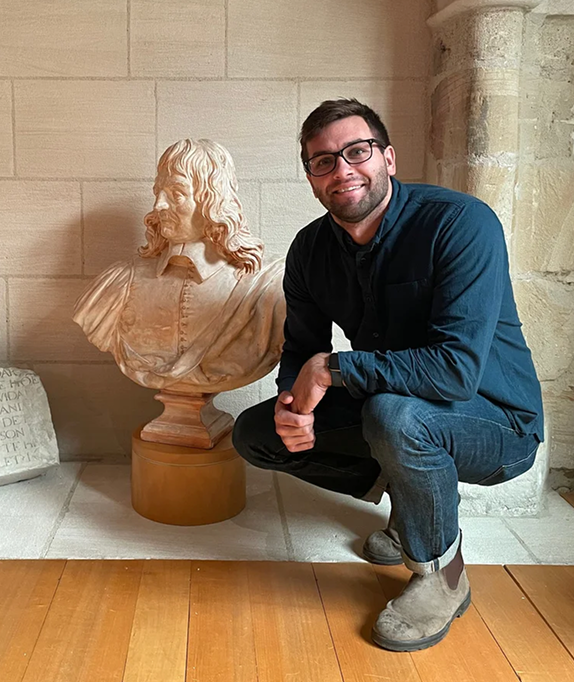PHILOSPHY INSTRUCTOR
Zachary Agoff, PhD
Currently teaching at Consumes River College, Yuba College, and Stanford Online High School.
Previously at UC Davis, University of Pennsylvania, San Francisco State University.
MY TEACHING
Charity, Inclusion, and Application
These three principles (among others) guide my approach. I aim for students to reconstruct and engage with the best possible versions of arguments and philosophical perspectives, while encouraging conversations around canon construction, implementing inclusive and equitable pedagogical methods, and seeking to apply even the most abstract debates to lived experience.
Courses taught in-person, online/sync, and online/async:
History of Ancient Philosophy
History of Modern Philosophy
Critical Thinking
World Religions
Intro to Philosophy
Intro to Ethics
Environmental Ethics
Political Philosophy
SELECTED STUDENT REVIEWS
Consistently positive feedback from students
“Dr. Agoff is AWESOME!... he was the most understanding and caring instructor I've had in a while and he made the subject so interesting! Loved taking his course!"
Student Review, University of Pennsylvania
“Dr. Agoff was very clear, organized, and intelligible when explaining whatever topic we were going over during class. He makes sure that the students understand the topic and made the class very interesting.”
Student Review, UC Davis
“Zach explains difficult information in way that is easy to understand while also extracting key ideas efficiently. 10/10"
RMP Review, Yuba College
“The clearness of what was expected greatly enhanced my learning because I was able to focus on the material. I wish he could teach the rest of my classes.”
Student Review, San Francisco State University
“...incredible ability to break down complex concepts into digestible information clearly. His slides are organized and comprehensive. Dr. Agoff is an engaging professor that has a great handle on the material and very clearly cares about his students."
Student Review, UC Davis
“This may be the best course I’ve taken in three years of college. He allowed me to learn and retain diverse information and new ways of thinking in a short amount of time....”
Student Review, San Francisco State University
MY RESEARCH
Specializing in Early Modern Philosophy
My research explores Descartes’s account of the emotions and his relation with the Catholic meditational genre. I also work on surfacing philosophical themes in St. Teresa of Avila’s work. I also dabble in environmental ethics, the philosophy of martial arts, and the philosophy of science.
Selected publications:
Abstract: In the wake of the recent movement to resurface and explore historically underrepresented figures in the history of philosophy, Teresa of Ávila has notably received little attention among philosophers. Of the literature that has been produced, most of the discussion is around Teresa’s potential influence over Descartes’s evil demon argument. In this essay, I turn away from this debate and demonstrate that Teresa diverges from Descartes on key methodological issues. In particular, I show that Teresa is primarily interested in states of ‘infused contemplation’ – passive, supernatural cognitive states, while Descartes explicitly distances himself from relying on such states. Along the way, I argue that Teresa is deserving of further philosophical attention, but not because her work may have served as source material for Descartes’s Meditations.
Abstract: Descartes maintains that we can love God and that it is pleasant and morally beneficial to do so. In this essay, I examine the necessary conditions for such an intellectual love of God. I argue that the intellectual love of God is incited by a judgment that we are joined to God in reality, which is constitutive of an intellectual joy. I go on to show that the intellectual love of God is, itself, constituted by a stripping of our private interests in favor of God’s divine will.
Abstract: Descartes claims that we can love God sensuously. However, it is prima facie unclear how this is possible, given that he is also committed to the impossibility of sensing or imagining God. In this essay, I show that Descartes has the metaphysical and psychophysical resources necessary to alleviate this tension. First, I discuss Descartes’s account of the intellectual love of God, demonstrating that the intellectual love of God constitutively involves the love of God’s creation. Second, I argue that an image of God’s creation is sufficient for communicating the intellectual love of God to the body, so as to produce a sensuous love of God. And third, I discuss Descartes’s reasons for developing an account of the sensuous love of God.
“Measuring Things That Measure You: Martial Arts as a Model for Complex Epistemological Practices in Science.”
In Philosophies, 2024.Abstract: Recent work by Keyser in applied epistemology of experiment has focused on the iterative ‘production’ of knowledge: knowledge stabilizes within a given physical context and it is iteratively tested within that context to meet standards of reliability. This implies that in a given physical context (e.g., laboratory), the inferences, methods/techniques, and physical products form coherence relations with one another. We apply this epistemological stabilization account to the martial arts in order to argue that the context of stabilization dictates the training methods, techniques, and even the philosophical concepts of a given martial arts system. We describe key elements of stabilization pertaining to rules, training methodology, warrior philosophy, and spectator/media tropes. The account of stabilization requires a case study that shows how a dynamic system is stabilized. We describe the stabilization of modern mixed martial arts by tracking it on a time scale, but also in different contexts (e.g., Pancrase, Pride, UFC).
GET IN TOUCH
